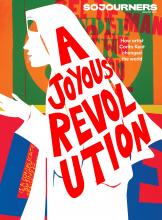WE LONG FOR new beginnings, a restart, to go back in time to correct our mistakes or dodge the harm someone has done to us. But those former lives are inaccessible to us. All we have is this life now. Here we are in the middle: after the beginning and before the end. Usually we associate “middles” with “stuckness”—not the excitement of the new and not the relief of an end but locked in between. For example, the morass that prompts a midlife crisis, that languorous experience of the middle of life that leads to the purchase of a motorcycle.
In the church calendar, we’re in the season called “ordinary time,” a long stretch of weeks between Pentecost and Advent. These are the middle months where the scriptures plop us into the middle of stories. And that is where we find Jesus. The incarnation is an act of God in the middle of Israel’s story: not the beginning, not the conclusion, but God-with-us in the middle. This season of unceasing tedium has also been taken up into the life of God. Perhaps we could describe the incarnation as the midlife crisis of God?
Jesus is the one who has been with us from before the beginning, who has witnessed the groaning of all creation, the births and deaths and the life in between—and comes to us now, where we are, in our midlife, with our regrets and unfulfilled dreams, and guides us as we wander into the ordinary goodness of life.
Read the Full Article

